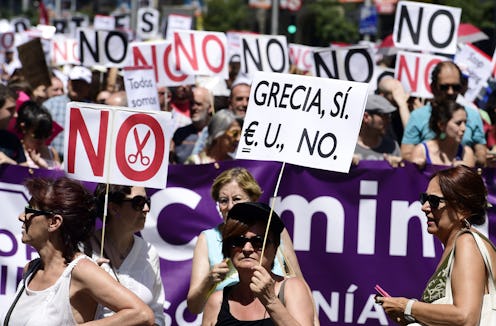News
Greece & Eurozone Reach Debt Agreement
After a 17-hour session of debate and deliberation that went well through the night, leaders of Greece and the eurozone reached a debt agreement aimed at keeping the financially beleaguered country afloat. The proposed program was made in principle by a unanimous decision Monday morning, according to EU President Donald Tusk, who confirmed the bailout on Twitter. Greece's parliament is expected to vote on the reform legislation Wednesday.
Tusk said the agreement, or "a-Greekment" as he quipped during a press conference Monday, would include "serious reforms" and "financial support." Last week, the Greek government requested a three-year, 53.5 billion-euro ($59.5 billion) deal, but negotiations revealed the country would need tens of billions more in order to stay on track and pay its debts. Tusk said in a statement:
The decision gives Greece a chance to get back on track with the support of European partners. It also avoids the social, economic and political consequences that a negative outcome would have brought.
Soon after, Greek Prime Minister Alexis Tsipras told reporters the proposed bailout would allow the country to "stand on its feet."
We found ourselves before difficult decisions, tough dilemmas. We took the responsibility of the decision in order to avert the implementation of the more extreme aims [of] the more extreme conservative circles in the European Union.
Greece's financial struggles has divided Europe's leaders over whether the country should stay or remain in the EU. During the press conference, German Chancellor Angela Merkel, who has led the call for stricter conditions, said she was open to allowing some debt relief but stood firm in refusing to cut Greece's debt level. She said additional measures could entail granting a longer grace period for the country to pay its creditors. Merkel also said the proposed deal is dependent on Greece asking for more help from the IMF beyond their current bailout program set to expire next spring.
The issue has also divided Greeks, who, in recent weeks, have taken to the streets to protest the government's failure to secure the country's economy amid staggering unemployment numbers and collapsing banks. Per the deal, Greece will continue using the euro, according to officials, a move that will likely face strong opposition from young unemployed Greeks who have called for a "Grexit" from the EU currency. Earlier this month, a resounding 85 percent of 18- to 24-year-olds voted "No" in the bailout referendum on the proposal by the European Commission, European Central Bank, and the International Monetary Fund.
And on Twitter, a cacophony of voices stood behind the hashtag #ThisIsACoup to protest the decision. But some are speaking in favor of the deal. The coming days and weeks will indicate whether this third bailout plan will finally help Greece handle its debts and keep it from going under. Again.
